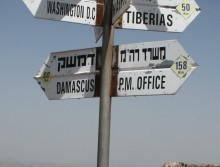
Syria at a crossroads? Photo: Signpost showing distance to Damascus. Illustrative. By Joshua Spurlock
The Syrian civil war continues to intensify, after state television claimed the Syrian Prime Minister was targeted in an explosion in the country’s capital, Damascus. Fighting in the capital city is an important measurement for the rebel’s progress—the regime will want to defend it very closely and so the more attacks in Damascus the more it appears the rebels are making progress.
However, the UK’s The Guardian newspaper cited a rebel activist who suggested the blast attack on the Premier’s convoy may actually have been staged by the government itself.
The Syrian civil war is believed to have killed more than 80,000 people, many of them civilians. Concerns the Syrian regime may have even used chemical weapons on their own people has raised the prospect of the US and Europe going to war in the country to end the fighting.
In addition, Al-Qaeda-linked terrorists are now fighting on behalf of the rebels, with the West anxious about powerful weapons reaching extremists. Those threats and the humanitarian catastrophe in Syria have the US and Europe wanting all the more for the civil war to end quickly. The status of the Syrian capital of Damascus and success for the rebels are extremely important in gauging how soon the conflict could finish.
On Monday, the state-run Syrian Arab News Agency (SANA) reported that Prime Minister Dr. Wael al-Halqi survived a blast targeting his convoy in Damascus. Images of a bombed out bus and damaged cars were posted on the SANA website. It said the attack did cause casualties and damage.
A rebel source for The Guardian, however, said the whole incident looks like those staged by the regime. The source noted the opposition was not quick to claim credit for the blast. He also said the explosion’s location is quite secure and getting a bomb into the area is difficult.
Meanwhile, on Sunday, the Syrian Observatory for Human Rights (SOHR) said state media reported that rebel mortar fire had reached the area near the Army General Command in the heart of Damascus. The report claimed only material damage was caused by the attack. It should be noted that destruction in the Syrian capital city was prophesied by the Bible more than 2,000 years ago.
(By Joshua Spurlock, www.themideastupdate.com, April 29, 2013)
